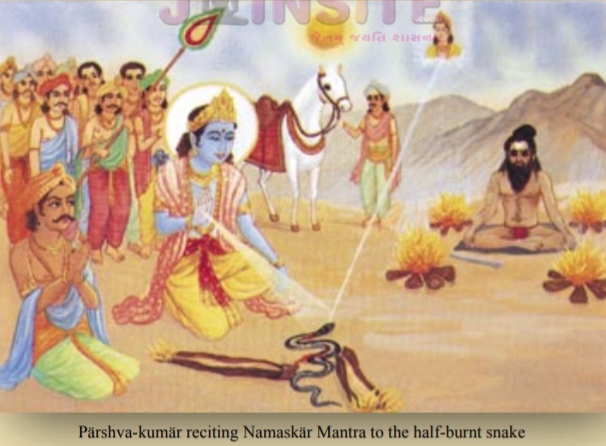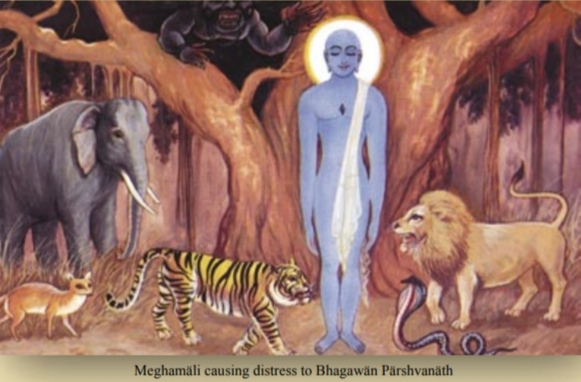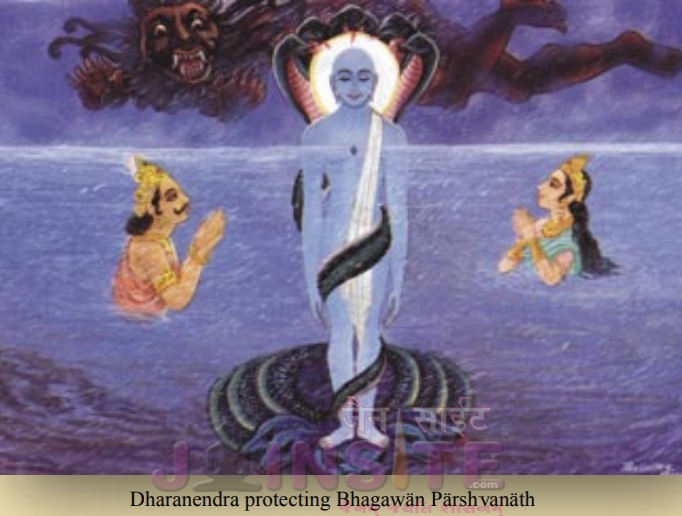Bhagawän Pärshvanäth
About 3000 years ago, King Ashvasen was ruling over the Kingdom of Väränasi also known as Banäras,in India. The city is situated on the banks of the holy River Gangä. He was a benevolent and a popular ruler and lived peacefully with his Queen, Vämädevi. On the 10th day of the dark half of the
month of Märgashirsh (which usually falls in December) Queen Vämädevi gave birth to a son. Once, during her pregnancy, she had observed a snake passing by. The passing of that snake made quite an impression on her. In memory of that incident, her newborn son was named Pärshva-kumär, because in the Sanskrit language ‘Pärshva’ means ‘near by or in the vicinity’.
Pärshva grew up in the midst of wealth and happiness and became a very attractive young man known for his courtesy, bravery, and valor. His reputation was well-known in all the kingdoms and many kings were eager to have their daughters marry him. Prince Pärshva-kumär was married to Prabhävati, a princess from a neighboring kingdom. The wedding ceremony was performed with much splendor and Pärshva- kumär enjoyed a blissful married life with Prabhävati.
At that time, there was a mendicant named Kamath. During his childhood he had lost his parents and was raised as an orphan. Disgusted with his miserable life he had become a mendicant. As a mendicant, he had no material possessions and lived on the charity of others. He practiced severe penance and performed rituals called Panchägni (five fires). He came to Väränasi to perform the Panchägni (five fires) ritual. Many people were impressed by his ritual and penance and therefore worshipped him.

Reciting Namaskar Mantra
When Pärshva-kumär heard about Kamath’s ritual, he realized the violence towards living beings involved in a fire. He came to Kamath and tried to dissuade him from lighting the sacrificial fire. Kamath denied that any life was at stake because of his ritual. However, by extra sensory perception, Pärshva-kumär sensed a snake trapped inside one of the burning logs. He asked his men to remove the log and chop it carefully. To everyone’s surprise, a half-burnt snake came out of the burning piece of wood. Pärshva- kumär recited the Namaskär-mantra for the benefit of the dying snake. The snake was so badly burnt that he soon died. After death, the snake was reborn as Dharanendra, the king of gods of the Nag kumärs (gods or angels that look like snakes) in heaven.
Instead of feeling remorse or pity for the snake, Kamath was very annoyed by the interference of Pärshva- kumär but was powerless at that time. He resolved to seek revenge. Kamath began observing an even more severe penance and at the end of his life he was reborn in heaven as Meghamäli, the god of rain.
Observing the miseries that living beings had to experience in their worldly life, Pärshva-kumär developed a high degree of detachment towards worldly possessions and relationships. At the age of 30, he renounced all his possessions and his family and became a monk. Later on, he was known as Pärshvanäth. He spent most of his time meditating in search of the ultimate truth. Once, while he was in meditation, Meghamäli saw him from heaven. He recalled how Pärshva-kumär had interfered in his ritual and penance in an earlier life and saw his chance for revenge.
Using his supernatural powers, he brought forth all kinds of fierce and harmful animals such as elephants, lions, leopards, and snakes to attack monk Pärshvanäth. However Pärshvanäth, immersed in deep meditation, remained peaceful and untouched. Then Meghamäli tried a new tactic and brought forth heavy rains. The rainwater touched the feet of Pärshvanäth and started accumulating. The water rose up to his knees, then to his waist, and in no time it reached his neck.
Dharanendra noticed that Pärshvanäth, his benefactor was going to drown in the rising floodwater. Immediately Dharanendra descended and placed a quick growing lotus flower below Pärshvanäth’s feet so that he could float on the water. Then he spread his fangs over the head and sides of Pärshvanäth in order to protect him from the pouring rain. Dharanendra then severely reprimanded Meghamäli for his wretched act and asked him to stop the rain. All of Meghamäli’s efforts to harass Pärshvanäth were in vain. He was disappointed and realized that he was unnecessarily creating trouble for the graceful, merciful Lord. He withdrew all his supernatural powers and fell at Pärshvanäth’s feet with a sense of deep remorse. He
sincerely begged the Lord to forgive him for his evil acts.

Distress to Bhagwan Pärshvanäth
During that period of distress, Pärshvanäth had been deep in meditation. He had not been aware of Meghamäli’s attacks or Dharanendra’s protection. Pärshvanäth had developed perfect equanimity. He did not have any special affection for Dharanendra for the protection he had extended or hatred for Meghamäli for the distress he had caused. Developing a higher purity of consciousness, he ultimately attained omniscience on the 84th day of his renunciation. That was the 4th day of the dark half of the month of Falgun (that usually falls in April).

Dharanendra Protecting Bhagwan Parshvanath


